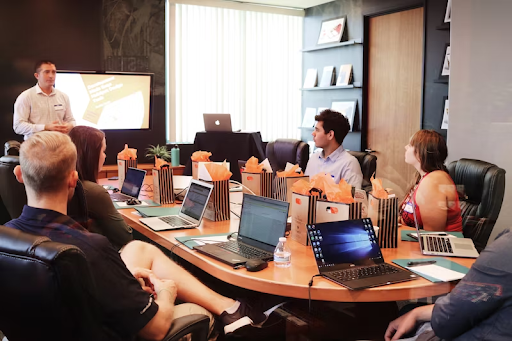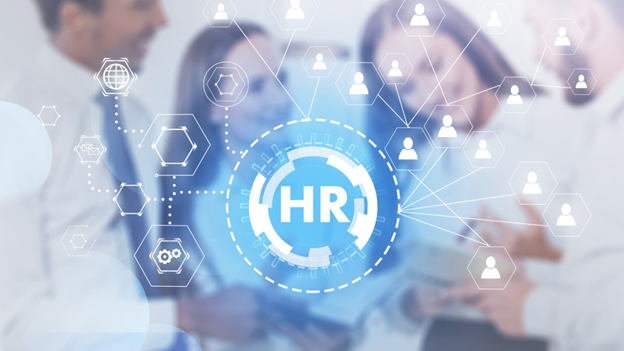Human resources departments are turning to AI as an essential tool in strategic human resources management, but there are both pros and cons to relying on it.
Artificial intelligence (AI) is taking the world by storm and bringing unlimited possibilities to every industry. As part of the advancing technology and digitization movement, the concept of AI is both complex and simple. At its core, AI is intelligence that adapts and grows as it weaves through different experiences and concepts.
Strategic human resources requires that you look to the future as you develop and implement new HR programs and strategies. This carries over into the hiring process as you try to identify which candidates you need to meet the company’s future goals.
The three steps of strategic HR involve hiring, managing, and developing employees. AI can help sort data quickly, identify the best candidates and bring them on before another company has the chance to hire him. When humans and AI work together, your chances of getting the best talent in the industry increase greatly.
Experts believe that by 2023, more than 75% of human resource organizations will utilize AI in some way. While extremely valuable in the talent acquisition and hiring processes, there are both benefits and challenges in relying too heavily on AI.
How AI Helps With Talent Acquisition
New technology is constantly emerging, and staying relevant in any industry requires that you adapt. As you work AI into your hiring processes, you’ll enjoy the following benefits.
Streamline Application and Resume Sorting
Hiring teams notoriously face tedious tasks as they sort through CVs and resumes for every single job. This is one of the ways that AI can be extremely helpful in minimizing wasted time.
Recruiting software powered by AI can screen hundreds of resumes for each job to identify levels of experience and relevant skills. AI can place job ads across social media and job sites and present a hiring manager with the best candidates for the job. This makes the hiring process much more efficient and effective and allows your higher-level employees to focus on more important tasks.
Using AI also gives insight into how serious a candidate is about a job. Those who want to get noticed will use a resume or CV maker to create a document that hits all the important points in your job description.
Communication Chatbots
AI can be a great way to engage with potential candidates and to catch their attention. Many HR departments use AI to get basic information about candidates and to schedule interviews.
This means that candidates don’t wait as long to hear back from your company, and they have a better experience with your organization even if they aren’t hired.
Limit Bias in Candidate Selection
All humans have unconscious bias that influence how they make decisions. We all draw on past thoughts, perceptions, opinions, and ideologies to make choices.
This bleeds over into every industry in the process of candidate selection, and many don’t even realize they are doing it. Because machines don’t have thoughts or opinions, using AI limits bias in candidate selection.
The Downside to Using AI
The goal is to balance your use of AI to a point where the experience is net positive. This may take a bit more effort up front as you determine which AI program is ideal for talent acquisition and program it to meet your needs. While you do this, be aware of the challenges that come with using software for recruitment.
AI Functions Best With a Lot of Data
For AI to be functional in the world of HR, it needs extensive development. It’s essentially a combination of programming, framework and data that emerges into human-like intelligence. Not only does this require a lot of work up front, but the program requires updating and assessment regularly to keep it relevant.
It Lacks a Human Touch
AI can assess abilities and skills, but a certain level of perception and feeling is necessary when choosing candidates. You still need a human touch to do a deeper analysis of someone’s moral values, family orientation, social life and other additional social factors. AI can’t determine if someone is a good fit for company culture, and studies show that workers value culture as one of the most important aspects of a job.
Technology Isn’t Entirely Reliable
When it comes to technology, we have come a long way since the early days of the internet. You can now recruit talent from all over the world for any job, and many employees work remotely. This broadens the pool of talent you draw from every time you hire. While AI can help manage this, the technology isn’t entirely reliable.
AI makes decisions based solely on criteria you tell it to watch for. As humans are the ones who give the program the information, there is always a spot for human error in computer science.
Limits Candidate Pool
If you use AI to screen one applicant, it should screen them all. This limits the way applicants can submit their resume or application. Because AI needs a sense of organization to remain objective and qualitative, companies occasionally miss out on resourceful employees who approach the company at unique times and in different places.
You may meet a good job candidate at a networking event and find that they don’t make it through your AI program. In this way, AI’s lack of bias works against you and may limit your ability to acquire talent in person.
Finding the Balance
Ultimately, AI is a great tool for people to use to make their jobs easier, but it’s not intended to completely replace humans in the workforce. When you strip AI down, it’s still just an idea that a human put together, where a human puts in the data and a human collects the information. This highlights how AI and humans should work together, rather than one replacing the other.
HR Future Staff Writer

























